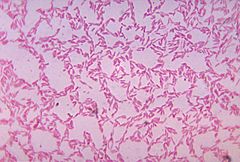Bacteroides facts for kids
Quick facts for kids Bacteroides |
|
|---|---|
 |
|
| Bacteroides spp. anaerobically cultured in blood agar medium. | |
| Scientific classification | |
| Kingdom: | |
| Phylum: | |
| Order: |
Bacteroidales
|
| Family: |
Bacteroidaceae
|
| Genus: |
Bacteroides
Castellani & Chalmers 1919
|
Bacteroides are a type of bacteria that live in many places, especially inside animals and humans. They are known as "gram-negative" bacteria, which is a way scientists classify them based on their cell walls.
These tiny organisms are anaerobes. This means they can live and grow without needing oxygen. In fact, oxygen can even harm them! Bacteroides species do not form endospores, which are tough, protective shells some bacteria make to survive harsh conditions. Some types of Bacteroides can move around, while others cannot.
Scientists have found that Bacteroides have special fats called sphingolipids in their outer membranes. This is unusual for bacteria. They also have a special chemical called meso-diaminopimelic acid in their cell walls, which helps keep them strong.
Contents
What are Bacteroides?
Bacteroides are a group of very common bacteria. They are part of a huge family of tiny living things called microorganisms. These bacteria are so small you need a powerful microscope to see them. They are shaped like rods and are usually found in places where there isn't much oxygen.
Tiny Helpers in Your Gut
Most Bacteroides live in the digestive system of humans and animals. This includes your intestines! They are a big part of what scientists call your "gut flora" or "gut microbiome". Think of your gut as a busy city, and Bacteroides are some of its most important citizens.
How They Help You
These bacteria are usually very helpful. They play a big role in breaking down food that your body can't digest on its own. For example, they help process complex carbohydrates and fiber from plants. This process releases nutrients that your body can then use.
Bacteroides also help protect you from harmful bacteria. They take up space and use resources in your gut, which makes it harder for bad bacteria to grow. They can even produce substances that stop harmful germs. So, they are like tiny guardians inside you!
When They Cause Trouble
Even though Bacteroides are mostly good, they can sometimes cause problems. If they leave the gut and get into other parts of the body, like the bloodstream or other tissues, they can cause infections. This usually happens if someone has an injury or surgery. But in their normal home, your gut, they are usually your friends.
How Scientists Study Them
Scientists study Bacteroides to understand how they affect our health. They grow these bacteria in special dishes in the lab, making sure there is no oxygen. This helps them learn about how Bacteroides grow, what they eat, and what chemicals they produce.
Understanding these bacteria helps doctors treat infections and learn more about how our gut health affects our overall well-being. Researchers are always finding new things about these amazing tiny organisms.
See also
 In Spanish: Bacteroides para niños
In Spanish: Bacteroides para niños
 | Janet Taylor Pickett |
 | Synthia Saint James |
 | Howardena Pindell |
 | Faith Ringgold |

